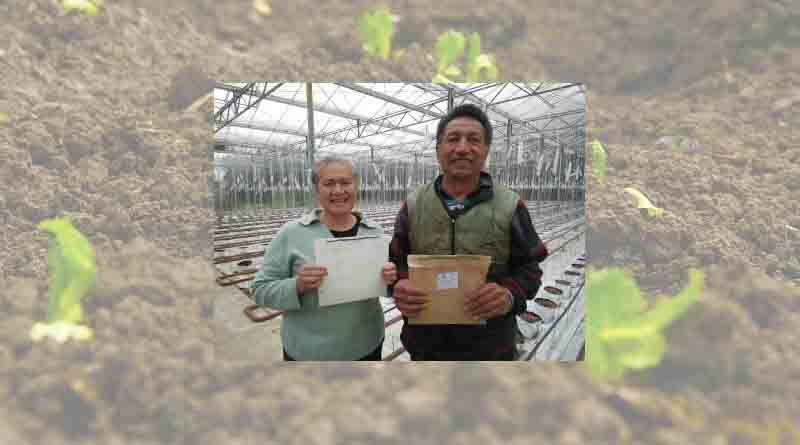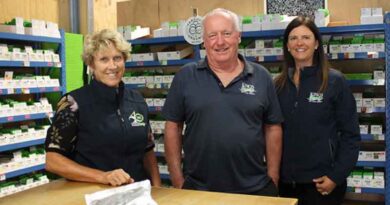Innovation and learning at the heart of vegetable growing business
29 August 2022, New Zealand: For Samoan growers, Reupena and Eseta Kovati, community is central to all they do. GLENYS CHRISTIAN speaks to the duo about how they fared during the pandemic and how they have helped both their community and business grow.
Kovati Yam-Tam Gardens owners, Reupena and Eseta, lowered the price of vegetables sold at their Glenbrook gate, south of Auckland, during the first Covid-19 lockdown as well as donating produce to the local school, their church in Waiuku and its food bank.
“I learned from my Chinese father, you do what you can with what you’ve got,” Eseta says.
While some of their many repeat customers say they should charge more, instead the pair look at what it costs to produce their vegetables.
“All you need is a roof over your head and to be able to put food on the table and pay your bills.”
The couple met over 30 years ago in Onehunga, although both are from Samoa where their families have a long history of growing. Reupena decided against studying horticulture at the University of the South Pacific and instead completed an apprenticeship at Alfriston company, Zealandia Horticulture Ltd, at the urging of a teacher at his school, Ron Walden. Reupena later returned to Samoa, working for the agriculture department for three years improving varieties of cacao, a major export crop, before again returning to New Zealand in 1983.
“I wanted to be self-employed,” he says.
When Reupena met Eseta, a bookkeeper at the time, she convinced him they could combine their skills and work for themselves. First, they trailed growing chrysanthemums at their rented home in St Johns. Reupena worked at Rainbow Park Nurseries in Bombay at the time while Eseta worked at Harred Distributors in Newton, receiving and distributing clothing stock.
The pair put their horticulture skills to the test in 1985, leasing a 800 square metre of glasshouse at Walmsley Road in Mangere to grow tomatoes under a trial semi-hydroponic system set up by J. Thompson. Their mission became quality first and quantity last – a mantra which continues to serve them well.
Having been successful in their tomato venture, Reupena and Eseta went on to purchase one hectare further south in Karaka, expanding their operation to grow cabbages, cauliflower and broccoli, selling them through Turners & Growers auctions as well as regularly taking a stall at the Otara markets.
Looking for a better water supply, a move to Glenbrook to the west appealed. They found a 1.4-ha block without a title which had been sub-divided off a dairy farm.
“It was a big step up,” Reupena says. “I had to be a man of all trades.”
With money loaned from the Pacific Development and Conservation Trust, Reupena was able to build a packhouse and separate accommodation for them and their four children. At first, they grew tomatoes in a plastic house, then chillies, scallopini and courgettes in a tunnel house. Kale was added and they were some of the first to extol its health benefits.
Reupena and Eseta added a new, 1536 square metre glasshouse in 2006, using half of the space to grow acid-free tomatoes and the other half to grow runner beans with batches of 1000 seedlings going in four weeks apart. No heating is used but an automated system regulates nutrients and wastewater which drains outside through soil channels under the flooring and is re-used to water vegetables growing in car tyres.
With the glasshouse well-established, Eseta went in search of other crops that could be grown without heating and found the answer in a Kings Seeds catalogue. She purchased some snow peas, planting them in a plastic house as a trial. The product was eagerly snapped up both by MG Marketing and by customers and proved a good fit with their other crops.
“We can grow them from April to December then concentrate on the tomatoes,” Eseta says.
The business is constantly looking for opportunities to innovate as it grows. A transition away from plastic has seen the operation introduce alternative packaging over the past three years.
Eseta sourced some white paper bags she saw at a local fish and chip shop and now uses them to package the operation’s snow peas. They started with the white bags for Grade 1 snow peas then added the brown ones for Grade 2, making identification easy. Both are sold through MG Marketing.
“All the things we do we look up ourselves,” Eseta says. “We looked at paper bags because they were compostable.”
Eseta designed self-adhesive labels too, printing them off at home and adding flax strips to tie the 500-gram bags at the top. After the strawberry tampering incident in Timaru, she worked out a way of threading the flax back through the holes to lessen the risk of them being opened in the store.
“Flax seemed an obvious and environmentally friendly choice to tie the paper bags up with,” she says. “We were already making things with flax and it meant we could burn it after and use the ash in the garden.”
Eseta also dries banana leaves in the sun to wrap their beans, finishing off with a flax tie, making them a popular buy at the market.
After 34 years of selling at Otara, the pair now only sell their produce at the Pukekohe market every fortnight. Their retirement plan is to spread their message of the benefits of vegetables further afield. Already, they have encouraged Pacific people to grow more of their own vegetables by running a pumpkin growing competition.
“At funerals there will be a lot of cakes but no vegetables,” Eseta says. “It breaks my heart. We want to educate people about the wide variety of fruit and vegetables that are available year-round in NZ, as an alternative to popular fast-food options.”
Reupena believes taking the GST off fresh vegetables would help boost consumption and that the 5+ A Day campaign can be taken further.
“For each of those five fruit and vegetables there are 25 good things people are putting in their bodies such as antioxidants and vitamins.”
(For Latest Agriculture News & Updates, follow Krishak Jagat on Google News)















